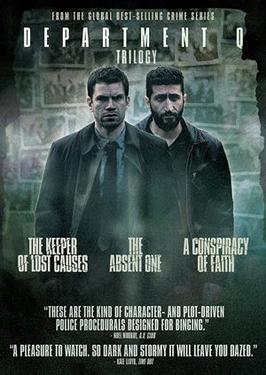Explore the Department Q Danish film series, based on Jussi Adler-Olsen’s bestselling novels. This review covers all six films, the characters, themes, and the evolution of Nordic noir in one compelling crime saga.

🔎 Introduction to Department Q: A Nordic Noir Masterpiece
Based on the globally bestselling novels by Jussi Adler-Olsen, Department Q is a gripping Danish film series that has captivated fans of Nordic noir across the world. Spanning six films (with four more in development), the franchise dives deep into cold case investigations led by the brooding detective Carl Mørck and his loyal partner Assad. Known for its haunting cinematography, complex characters, and social commentary, Department Q blends suspense, emotion, and stark realism into one unforgettable cinematic experience.
⸻
🎥 Overview of the Film Series (2013–2025)
The series kicked off with The Keeper of Lost Causes (2013), followed by The Absent One (2014), A Conspiracy of Faith (2016), The Purity of Vengeance (2018), The Marco Effect (2021), and most recently Boundless (2024). These six films, directed by notable Scandinavian filmmakers including Mikkel Nørgaard and Martin Zandvliet, are faithful adaptations of Adler-Olsen’s novels, each tackling a different unsolved mystery from Denmark’s underbelly.
The latest entries shift direction slightly with a new cast and production team under Nordisk Film, continuing the franchise’s dark tone while exploring broader themes of immigration, abuse, and corruption.
⸻
👮♂️ The Heart of the Series: Characters & Performances
• Carl Mørck is initially portrayed by Nikolaj Lie Kaas (films 1–4), delivering a deeply layered performance as a disillusioned detective haunted by past trauma. In the later films (5–6), Ulrich Thomsen takes over the role, bringing a colder, more calculating edge to the character.
• Assad, played by Fares Fares (1–4) and later Zaki Youssef and Afshin Firouzi, is the perfect counterbalance to Carl—a warm, principled immigrant detective with his own hidden past.
• Supporting roles by Johanne Louise Schmidt and Sofie Torp offer compelling depictions of women in law enforcement, often overlooked in typical noir narratives.
The chemistry between Carl and Assad remains a highlight across all entries, with their evolving partnership serving as the emotional core of the franchise.
⸻
🧩 Plot Themes: Cold Cases & Dark Secrets
Each film follows the Department Q team as they dig into unresolved cases buried by time, bureaucracy, and sometimes deliberate cover-ups. From missing persons and child abuse to religious extremism and political corruption, the stories never shy away from controversial or harrowing subject matter.
• The Keeper of Lost Causes sets the tone with a missing woman’s case that is far more sinister than it first appears.
• The Absent One tackles elite school abuse, revenge, and guilt.
• A Conspiracy of Faith weaves religion into a terrifying child abduction mystery.
• The Purity of Vengeance explores eugenics and forced sterilization programs in 1950s Denmark.
• The Marco Effect introduces international crime and refugee exploitation.
• Boundless continues the trend, diving into the criminal underworld with sharper sociopolitical undertones.
These deeply human tales resonate not just as thrillers but as indictments of institutional failure and societal neglect.
⸻
🎬 Direction, Cinematography & Music
Visual storytelling is a cornerstone of Department Q. The films utilize cold, desaturated color palettes, fog-drenched landscapes, and claustrophobic interiors to build a bleak, unsettling atmosphere. Cinematographers like Eric Kress, John Andreas Andersen, and Aske Foss help define each film’s visual identity.
Each director brings a unique flavor:
• Mikkel Nørgaard’s early entries are taut and suspense-driven.
• Hans Petter Moland and Christoffer Boe lean into psychological tension.
• Martin Zandvliet and Ole Christian Madsen steer the later films into grittier, more expansive territory.
The music, though subtle, often haunts long after the credits roll, amplifying the emotional weight of the narratives.
⸻
🌍 Cultural Impact & Global Reach
While deeply rooted in Danish society, Department Q’s themes are universal. The transition to a Netflix English-language adaptation set in Scotland speaks to its global appeal. Although purists may prefer the original Danish tone and character depth, the series’ core message—seeking justice for the forgotten—transcends borders.
⸻
📊 Box Office & Budget
With a combined budget of €35 million and a Danish box office return of over DKK 287 million, the franchise is not only critically acclaimed but also commercially successful. This blend of arthouse storytelling and mainstream appeal is rare for Nordic cinema, making Department Q a trailblazer in the genre.
⸻
📝 Final Verdict
Department Q isn’t just a series of crime thrillers—it’s a reflection of societal wounds, a masterclass in atmospheric tension, and a character-driven exploration of trauma and justice. With consistently strong writing, evolving performances, and bold direction, it remains one of the finest Nordic noir franchises ever produced.
⸻
⭐ BMR Rating: 8.7/10
A chilling, thought-provoking, and emotionally resonant series that redefines cold case crime thrillers. Department Q is a must-watch for fans of Scandi-noir and detective dramas alike.